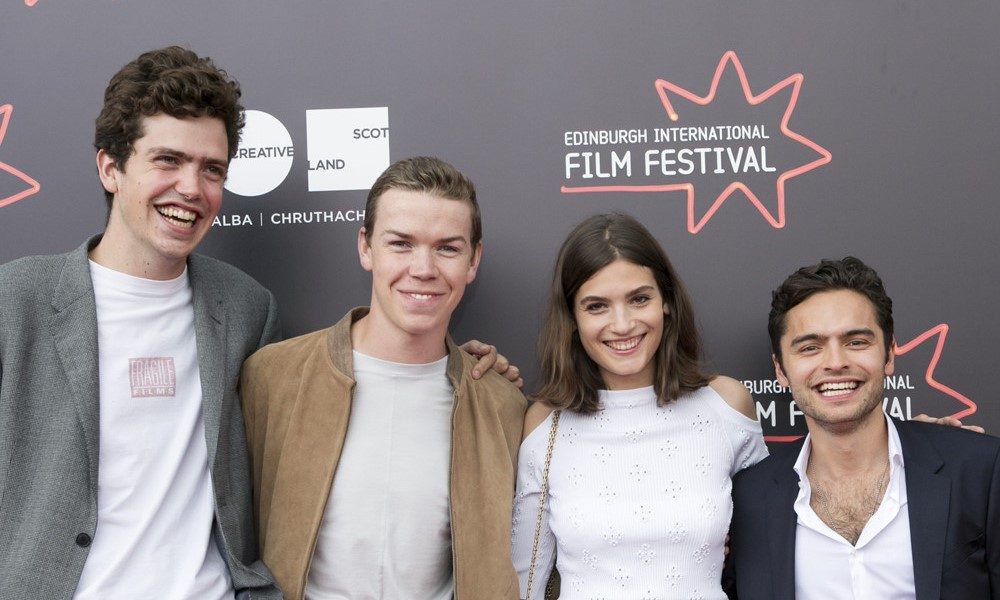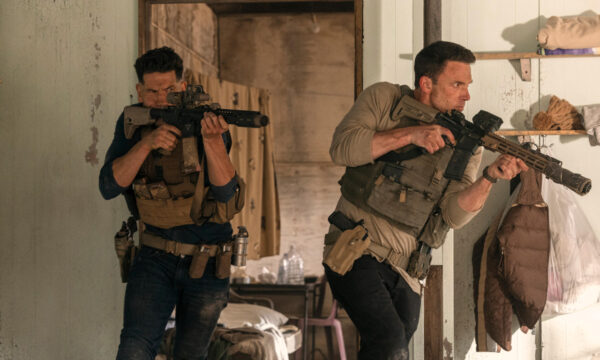Kids in Love: An interview with screenwriters Sebastian de Souza and Preston Thompson

Kids in Love is the feature film debut from screenwriters Sebastian de Souza and Preston Thompson and is directed by Chris Foggin. It’s a coming-of-age tale that follows Jack (Will Poulter) and his chance meeting with free spirit Evelyn (Alma Jodorowsky). Captivated by her, Jack immerses himself in Alma’s bohemian, dreamlike world, which acts as the impetus for him to start navigating his own identity. We were lucky enough to catch up with both Sebastian and Preston who wrote and act in the film. Kids in Love is released Friday 26th of August 2016.
Hi, congratulations on the movie. At what point did you realise you’d written a screenplay that was good enough to be made into a film?
Sebastian de Souza: We’d written a script that we weren’t really sure of in its earliest form. In our initial draft, Milo dies in the country house by setting himself alight. It’s like a completely different movie and one that would be far too expensive for us to make. Through the development process we worked with an incredible development executive called Sophie Meyer, and she helped make the story what it is now. Until we actually got to the first day of principal photography it didn’t feel real and then it suddenly hit.
Preston Thompson: We were 19 and hadn’t had that much experience writing scripts and neither of us had been to film school. With Sophie, you realise what you’re doing in five pages can actually be done in two pages. We didn’t know if we had a good script or not, but the actors that we got to audition made us think that people actually want to do this.
How did you come up with this story? Was there anything in particular that inspired you?
SS: I was in Hungary doing a TV show called The Borgias and Preston came to visit me. He brought me this photograph he’d come across: a bunch of kids hanging out and it said “Kids in Love”. He said “I really like that title why don’t we write something around that?”. We sat down and came up with this story about a young man who wants to be something but doesn’t know how to.
PT: Both of us had elected not to go to university. We were both very fortunate in knowing what we both wanted to do. Evelyn’s part was written as an English girl but our casting director said “Have you thought about making her foreign?”. Then Alma did her audition and we were like that’s the person, so we went back to the script and altered it. For her first English language film she did an unbelievable job. She captured everything we wanted.
What came first the story or the characters?
SS: We both had different characters, either people we loosely knew or people who we’d invented that we wanted to write about.
PT: We were quite keen on not having a happily ever after film. You can fall in love and it doesn’t actually work out. Evelyn is the vehicle for Will’s character to have the confidence of his conviction.
The director, Chris Foggin, is a very promising talent, how was it working with him?
SS: We built up a dream list of young directors, and Chris came in and pitched his vision for the film and we were like, immediately, this is our guy.
PT: Seb and I must have watched close to 500 short films. Chris’ were both remarkable in the sense that he was so young and he had done two short films that had a beginning a middle and an end, which is difficult to do in 12 minutes. When we met him he was really enthusiastic and he had so many ideas for the film.
Does it make it harder to act on your own screenplay? For instance, on the set if the other actors do not get the lines right did you feel like saying something?
SS: Like most of the actors we were very new to the game so we weren’t really standing around making suggestions. When we shot Kids in Love I realised why it’s so important to say the words written on the page because there are so many more things at play.
PT: Cara and Gala worked really hard on developing their roles as the sisters and finishing each other’s sentences. Alma was the unknown quantity, but her audition was so breathtakingly good. You’re still doing the script while your shooting, doing little changes all the time.
Will Poulter is a quite high-profile actor, were you excited when he was cast for the role of Jack?
SS: I did a movie called Plastic and Will was also in that film, and I had this script that Preston and I had written. I rang Preston and said wouldn’t Will be incredible to have? So I gave Will the script and he came back to me and said I’d like to play Jack. Will has become one of the most sought after and extraordinary young actors in the world, so it’s massively gratifying to have the honour of him being in our movie.
PT: I watched him in School of Comedy and I thought how he is so good. He’s so talented and he works so hard. Watching him and Jamie Blackley speak your dialogue is even better than you imagine.
When you were writing the screenplay did you always have yourselves in mind for the roles of Milo and Cassius?
SS: I think we always wanted to play those parts, and maybe that slightly coloured how we wrote them.
PT: I knew I wanted to create a character that had patter and it became clear that I wanted to do it. My subconscious was pushing for me to do it. I’d written it in a way that I knew how to say it.
As co-writers, why do you think you both work so well together?
SS: We were just writing a film that we’d want to watch or would want to be in. It never became laborious, it was always just a couple of guys sitting around having a good time.
PT: We talk in similar ways. We knew all the characters we had in the film, whether they were combinations of real people or not. We tended to have the same voice, and there were certain characters that Sebastian was better at writing and certain characters that I was better at writing.
Did you disagree on anything in particular in the screenplay?
SS: I think we learnt that you have to give to get. We knew this was about making the best thing that we could make as opposed to one-upping each other.
PT: I can say an idea he doesn’t like or he can say an idea that I don’t like, but then we compromise.
Did you have a message in mind that you wanted to get across when writing?
SS: Do what you want to do and follow your gut, because you’re the person in the end who is going to have to live with the consequences. When you’re young there are lots of paths open to you, and you need to discover them.
PT: Someone showed me this great Alan Watts speech about what do you actually want to do. It’s a three-minute clip on YouTube and it had such a resounding effect on the two of us. It answers that question about what do you actually want to do with your life if money didn’t matter?
How detailed is the script, for instance did you have a particular soundtrack in mind when writing certain scenes that you suggested?
SS: You’re not afforded the luxury of writing in the song you’d like to be played. To actually see it played in the feature you literally have to be Quentin Tarantino.
PT: I write songs in scripts, it’s always something I’ve done. How many of those songs are now in the film? Probably none, maybe one. Due to expense reasons and due to the fact people don’t share my music tastes.
How familiar are you with the world that’s portrayed in the film?
SS: I don’t think anyone is totally familiar with that world because, as with all drama, you heighten characters and stories. We had characters that we’d come across in our own lives and in our own minds. The people were certainly versions of those characters. My life is unfortunately a lot more boring than that. I’m not staying up all night walking around London. I’m in bed with my cup of cocoa.
PT: That bohemian lifestyle was just right around the corner from us. The first few drafts were darker than the film is now, but Chris made the decision that it sort of took you out of the love story a bit. Chris said: “Concentrate on Jack’s world and the love story; you can lose the message of the film if you spend too much time with the other stuff.”
Do you think the coming-of-age genre has evolved at all?
SS: For me, Dazed and Confused is the one that gets it right. Chris wanted to create an aspirational coming-of-age story that said “wouldn’t it be fun if this was how we all came of age”.
PT: My two favourite coming-of-age films are 400 Blows and The Graduate. I still don’t think anyone’s been able to top those two. There are great coming-of-age movies still to be made.
Do you see yourself writing something else in the same genre, or do you have other areas you’d like to explore?
SS: I’ve just finished a novel. In everything I write there’s an element of where I’m at in my life. I hope more 19-year-olds are given the opportunity to write about what they know. The feeling of being a young person is universal; it should be told on screen.
PT: My new script that I’ve just done is a dark comedy. I’d love to do another coming-of-age movie, it’s just about finding the right story.
Lewis Tighe
Kids in Love is released nationwide on 26th August 2016.
Watch the trailer for Kids in Love here:
https://www.youtube.com/watch?v=16Smpsx13Ao

























Facebook
Twitter
Instagram
YouTube
RSS